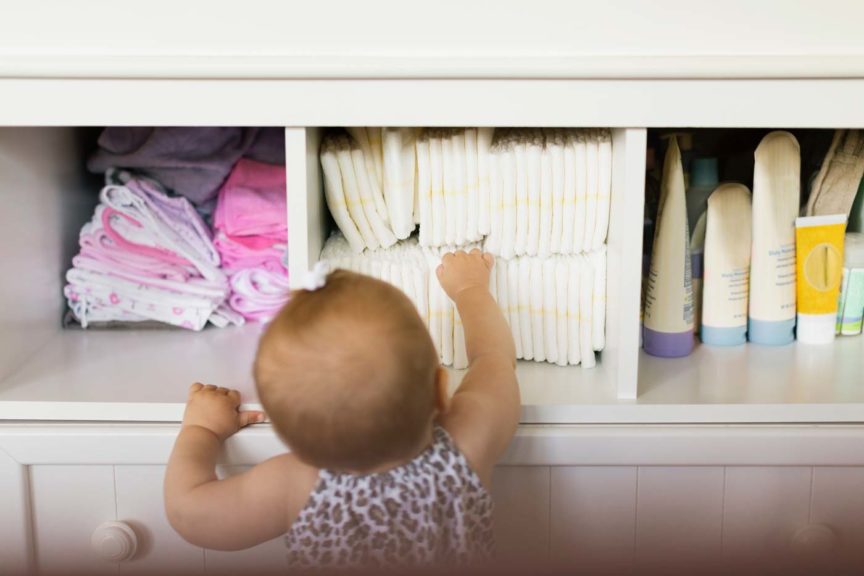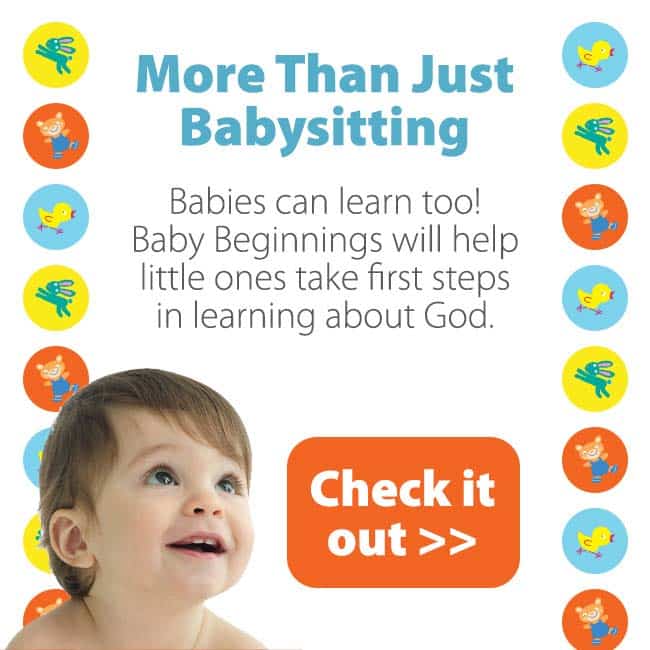To some, the church nursery may seem to be a “small” ministry because it’s away from the public eye. But it can develop into one of the most vibrant and life-changing ministries of your church!
When your church nursery sends the message “Come in! We are prepared, clean, competent, and caring,” you are well on the road to building a strong relationship with families.
When that message is reinforced by the quality of care you give to children, families want to return!
What to Do in Your Church Nursery

1. Make a Great First Impression With a Personal Welcome
Remember that your nursery is “the handshake of the church.”
Your helpful attitude and friendliness convey a powerful first impression of what your church culture is like.
When a parent brings an infant or toddler to the church nursery, your friendly greeting and personal comment to or about the child send the message, “We remember and care about you!”
2. Have an Organized Check-in Process
Checking in babies gets complicated fast—you have to know who’s checking in whom, what room they’re in, who brought what, all while greeting parents and keeping track of who still needs to do paperwork.
And if you aren’t organized, parents notice.
Nobody wants to entrust their baby to a program that doesn’t keep track of which baby came with which parents, how to contact them if there’s a problem, or what special care their child may require.
Let parents sign in and see where their baby will be, who will be taking care of him or her, and how they can get a hold of you and vice versa.
3. Have a System for Taking Special Requests
Your volunteers should know how to safely handle and care for babies and young children, but you’re always going to have parents who have specific instructions for their kids.
And every parent should feel respected—regardless of how you feel about their requests.
Some of these extra directions may not seem like a big deal. Others have a big impact on how you care for a child—like an allergy or a medical condition.
Tell parents about your system for special requests when they drop off their kids, so your church provides the best possible care.
4. Look at Your Space From a Visitor’s Point of View
When we spend a lot of time in a space, it’s easy to miss signs of wear and tear and to not notice that some of toys (and even furniture) are getting pretty grungy.
Try to look at your nursery room through the eyes of a new parent. Does the space look friendly and engaging for their child? What is there for them to see, touch, and hear?
Infants need simple toys to explore their senses—high-contrast pictures, big plastic rings, and rattles.
Toddlers need toys to help them develop their fine motor and social skills—shape-sorting toys, sensory tubs, and dolls.

If items in the nursery start to show wear, don’t wait too long to replace them. Toys that look grungy create the wrong impression about your nursery, and you’re working to establish trust and confidence.
5. Define Your Nursery’s Age Range
School-age children should either attend the main service or have a separate area designated for kids their age.
Your staff may struggle to take good care of infants and toddlers if they’re also watching older kids.
Older kids can hurt toddlers, disturb babies, disrupt your childcare, and find creative ways to get into trouble—especially when they aren’t being watched closely.
Some parents may insist that their child is a very responsible sibling, or that you won’t even notice they’re there.
If you clearly define the age range intended for your nursery, you empower your volunteers and staff to tell parents “No.”
6. Have a Sickness Policy

Kids are walking petri-dishes. Babies and toddlers put their mouths on everything in sight, and their hands stay clean for about 2 seconds after you wash them.
A good sickness policy is an important part of protecting kids. It also prevents illness from spreading through the church and staff.
Clearly define what (if any) symptoms a child is allowed to have (such as a runny nose), what symptoms are not allowed (like a fever) and how long the child has to be symptom-free before they can stay in your church nursery.
Many daycares require kids to be symptom-free for at least 24 hours.
Every state childcare licensing department has its own policies, and while your church may be exempt from those regulations, your state department is always a great place to start as you develop child safety policies.
7. Run Background Checks on Volunteers and Staff
This is essential for protecting kids from harm and protecting your church from liability. Every volunteer needs to pass a background check before you make them responsible for taking care of someone else’s kids.
It’s not enough to gather references or have a personal relationship with a potential volunteer. Taking chances with child safety puts your whole ministry at risk—so check.
A minor should never be the primary childcare provider during a service. Any minor volunteering in the nursery should always be accompanied by at least 1 adult.
Require at least 2 adults in every childcare room for extra accountability.
8. Keep Childcare Necessities on Hand

Not every parent will bring a diaper bag full of supplies. How will your church serve parents who come unprepared?
Keeping your nursery supplied helps parents and volunteers alike feel more confident about your ability to care for kids. Create a plan to keep these—and other items essential to your nursery—well stocked:
- Diapers in assorted sizes
- Wipes
- Changing table covers
- Diaper disposal bags
- Antibacterial gel
- Burp clothes
- Receiving blankets
9. Show That the Church Nursery is More Than Just Childcare
Never forget that your ultimate goal is to see each family develop a growing walk with Jesus Christ.
Education expert Henrietta Mears once said, “First I loved my teacher, and then I loved my teacher’s God.”
Develop a plan for faith to be nurtured in the church nursery.
It is in this place of developing a trusting, safe, and loving environment that children begin to love their teachers. And as children begin to love their teacher, they get to know God working through them.
Babies and toddlers are not too young to start learning about God’s love for them.
10. Stay Connected During the Week
Even though a family has walked out of the church’s doors on Sunday morning, that doesn’t mean they don’t need your help and support during the week.
Here are some tips on staying connected with families who have young ones:
- Invite them to join a family-friendly small group.
- Send a text or social media message letting them know you are thinking about them.
- Check in with them by sending them a note or otherwise indicating that you remember that they were absent or that their child was ill.
Family ministry begins when adults in the church nursery realize that their role is much greater than just caring for babies—it’s caring for the whole family.
Families will be forever influenced by those who choose to support and love them in the exhausting time of life they are in.
What NOT to Do in Your Church Nursery
When it comes to childcare, there’s not much room for error. One bad experience can do a lot of damage to your ministry.
Here are 4 mistakes that are easy to make—and easy to guard against:

1. Don’t Admit Kids Without a Way to Contact Their Parents
If there’s an emergency in your nursery, you need to contact parents right away. No parent wants to hear after the service that there was a problem with their kid and you couldn’t find them.
Your volunteers and staff should know how to soothe babies and calm wild kids, but sometimes no amount of technique can overpower a child’s desire for mom or dad.
Don’t admit kids into your church nursery without having a way to contact their parents.
2. Don’t Mix Up Belongings
Kids are very comfortable grabbing things that aren’t theirs, and they’re equally skilled at losing things that are.
Don’t assume that a parent will remember everything they brought—or that they’ll notice when they’re given the wrong item.
Consider using plastic bins to keep track of what belongs to whom.
If parents give you supplies, toys, or snacks when checking in their child, label a bin with their name to keep it all in one place. Put the bins out of reach of toddlers so you can easily keep track of who has what.
3. Don’t Serve Unapproved Snacks

Unless a parent has given you permission, you should never give a child a snack.
Allergies are a huge concern, but they’re not the only reason you shouldn’t hand out food without permission. Some parents don’t give their kids sugar. Or dairy. Or gluten.
If you assume it’s okay without talking to each parent first, you could be undermining someone else’s parenting methodology or dietary needs. There are too many variables.
If you want to give kids snacks, ask for permission first.
If you give out unapproved snacks, you can expect that some kids (and their parents) aren’t going to come back.
Assume snacks are not okay until parents tell you otherwise.
4. Don’t Let Strangers Pick Kids Up
It’s easy to give people the benefit of the doubt—and it might be even easier to do in church. The family-like relationships we form in church make it easy to assume we can trust someone.
But when it comes to child safety, never let children leave with someone other than their legal guardian or the person who checked them in (unless you’ve been given explicit instructions).
Does your kids’ ministry decor inspire yawns…of boredom? It doesn’t take a huge budget to make an impact! Check out 6 Easy Ways to Renovate Your Children’s Ministry Space.

Reaching Kids Outside the Church Walls

How to Guard Yourself from Ministry Burnout














